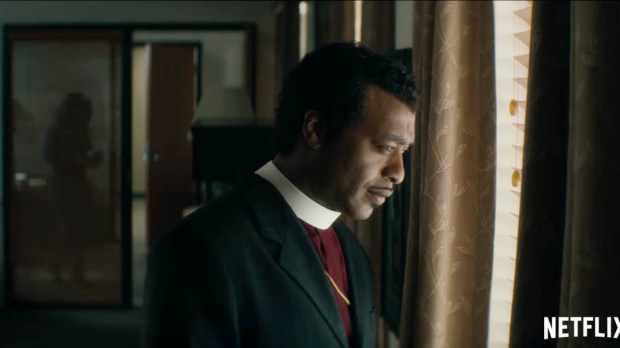Lenten Campaign 2025
This content is free of charge, as are all our articles.
Support us with a donation that is tax-deductible and enable us to continue to reach millions of readers.
Can a Christian believe that non-Christians might end up in heaven? Or even that all people—Christian or otherwise—will eventually be saved?
These are the questions at the heart of Come Sunday, a fascinating, if frustrating, Netflix biopic about Pentecostal minister Carlton Pearson.
The film opens on Pearson talking to a lapsed Catholic during a flight, a scene which he later recounts in a sermon. We’re introduced to a typical evangelical Christian who divides humanity into two categories: those who have accepted Jesus Christ as their Lord andSsavior and will be saved, and those who haven’t and won’t.
But Pearson is also a respected and popular leader. While attending Oral Roberts University, he was mentored by Roberts himself (played by Martin Sheen), who calls him his “black son.” By the late 1990s, Pearson’s booming megachurch, the Higher Dimensions Evangelistic Center, was drawing in an average attendance of 6,000 members across racial divides. In 2000, Pearson campaigned for George W. Bush and was later invited to the White House.
But in the early 2000s, things began to change—and this is where the story of Come Sunday takes off. A beloved uncle of Pearson’s, who had not been “saved,” hangs himself in prison—presumably rocketing his soul into hell. Pearson later watches coverage of the genocide in Rwanda, where young children who had never heard the Gospel are suffering and dying in the streets—again, presumably cutting them off from God forever. As he wrestles with these skewed judgements of God, he feels God speak to him: it’s his theology, not God, that’s skewed.
He announces this to his congregation: “Many people I loved, members of my own family, went to hell, and they’re there for good. Now I could never reconcile that, but I do accept it, because they had a choice. But when did these people in Africa separate from God? When did they make a choice? And how do they get saved? And [God] said, ‘They don’t need to get saved. They’re already saved. And I’ve taken them into my presence. They will all be with me in heaven.’” The cheers turn to murmurs. Later, Pearson is given an opportunity to recant with a sermon on Romans 10:9, but instead he turns to 1 John 2:1-2 and doubles down: by virtue of Christ’s sacrifice, Pearson says, “everyone’s already saved.” In a word, he adopts Christian universalism—and the murmurs inevitably turn to angry shouts.
As a character study of a man following his conscience (come what may), Come Sunday is a fascinating film—but as a theological film, it offers fairly hollow and frustrating answers to healthy spiritual questions. Don’t get me wrong: as a Catholic, I sympathized with Pearson’s initial breakthrough. Here was a man whose theology dictated that the only destination after death besides heaven is hellfire; that an explicit profession of faith in Jesus Christ (getting “saved”) is your only ticket into heaven; and that therefore, anyone who hasn’t been saved is condemned. But Pearson saw that this doesn’t seem to line up with the fullness of Christ revealed in the New Testament. And the Catholic Church agrees, not only teaching that there is a third destination (purgatory), but that salvation is a possibility for those who, “through no fault of their own,” do not know Christ or the Church (CCC 847). The respected Catholic theologian Hans Urs von Balthasar even argued (though not without similar controversy) that we can hope that all people will be saved—a hope reflected in both the Church’s scriptures and traditions.
But even as Pearson’s theology expands, his methodology is still restricted; he only has his Bible and private insights to go on. So he does what all human beings tend to do: he hooks himself onto a new, equally presumptuous train of thought, only this time traveling in the opposite direction. Pearson rashly leaps over a more balanced hope and right into the belief that everyone will be saved.
And the film is too busy lionizing Pearson to ask the tough questions about what that means. What does universalism mean for his flock wrestling with temptation? Why should what anyone does or believes ultimately matter at all? If everything leads to the bliss of heaven, isn’t every action or belief as good as any other? On the face of it, Pearson’s “Gospel of Inclusion” is a welcoming message about (as he puts it in
) “enhancing” people rather than “correcting” them. But this is not the open table fellowship of Christ (who often warned of “fiery Gehenna”); it’s the gospel of Christian universalism. And like the gospel of Christian triumphalism, it has its dark side—namely, relativism.Maybe the bigger question is this: Is Christian universalism even identifiably Christian? As Bishop Barron (who embraces von Balthasar’s position) recently pointed out in a pertinent homily, the idea that salvation will be everyone’s for the taking regardless of what path they follow is “just not biblical.” As it turns out, Catholic teaching on this subject reflects a typically thorough, balanced, centuries-long study of the whole symphony of Scripture. It places hope in the radical mercy of God and sees “rays of light” in other faiths—that’s true—but it also affirms the distinctive fullness of Christ’s revelation, makes tough moral demands on its flock, and calls Christians to evangelize the world.
There’s one powerful scene in which Pearson brings the tender mercy of Jesus to a tormented parishioner: “Jesus loves me this I know,” he sings gently, “for the Bible tells me so.” One wishes more Christians were as kind, loving, and present as he is in that moment. But one also wishes that Pearson had stopped to ask whether his new view of the Gospel was just as skewed and problematic as it was before.

